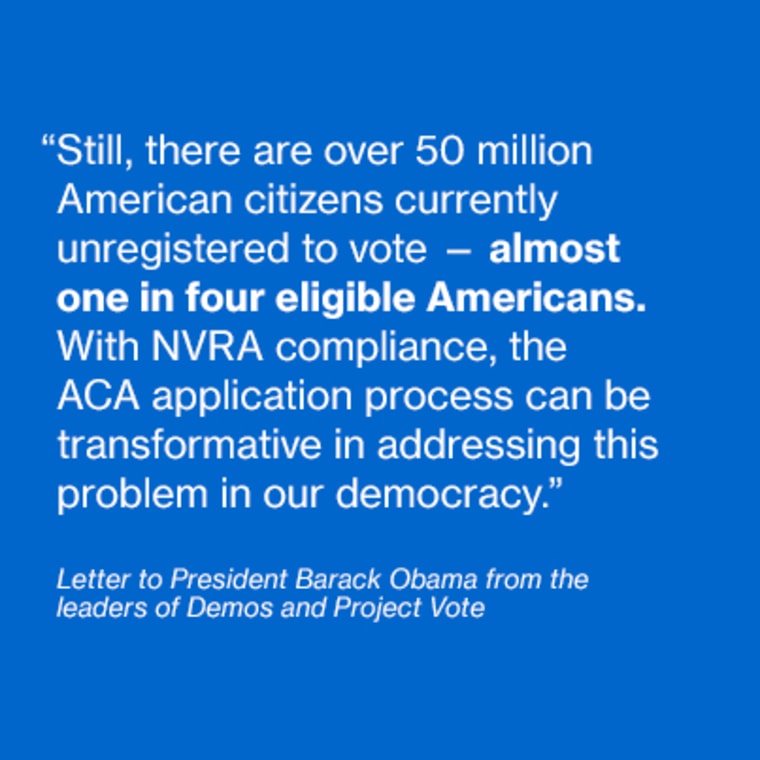The Obama administration is doing so little to help people register to vote when they sign up for the Affordable Care Act that it’s violating the law, good-government groups are charging.
Team Obama’s hands-off approach to registering voters through the health care law, or ACA, comes after Republicans—afraid of masses of low-income Americans registering—pressed the administration to soft-pedal the requirement.
In a letter sent Wednesday to President Obama, leaders of Demos and Project Vote claimed the application process for ACA benefits violates the 1993 National Voter Registration Act (NVRA).
Because the ACA application doesn’t do enough, the groups wrote in a press release, “several million Americans already have lost out on the opportunity to register to vote.” They added: “Millions more will be denied this right if the administration does not take action in the coming months.”
The NVRA requires that whenever someone applies for government benefits, or has business with the DMV, he must be offered help in registering to vote. Known as “Motor Voter,” the measure has been responsible for millions of Americans being brought into the process.
The letter was sent the same day that a presidential commission released a report with recommendations on how to improve the voting process—including better enforcement of the NVRA and other efforts to boost registration.

By almost any measure, the application process for the federal healthcare exchanges does the bare minimum to help people register: It includes a sentence near the bottom reading: “If you want to register to vote, you can complete a voter registration form at usa.gov.”
That takes applicants to a general government assistance site that includes no information about voting on its homepage, requiring people to use the search tool. Experts in designing such systems say that kind of multi-step approach is an ineffective way of getting large numbers of people to register.
The White House referred a request for comment to the Center for Medicare and Medicaid Services, which suggested in a statement to msnbc that the sentence used on the form is enough to comply with the NVRA.
But Demos and Project Vote counter that the NVRA in fact requires far more.
The government agency offering benefits, they say, must ask the applicant, in writing, whether he’d like to register; distribute a registration form (unless he says no in writing); and help him complete the form, to the same extent that they offer help with the benefit application.
“It may be tested in the courts, because it’s not clear that it does meet the requirements,” Gerry Hebert, a veteran voting lawyer and a former top official at the Justice Department’s civil rights division, told MSNBC in September, referring to the ACA application.
The administration’s minimalist approach to the voter registration requirement comes after pressure from Republicans to do as little as possible.
In March, Rep. Charles Boustany, a Louisiana Republican, wrote to the administration raising concerns about the very idea that Obamacare applicants would be asked about registering.
“While the healthcare law requires that government agencies collect vast amounts of information about Americans’ personal lives,” Boustany wrote, “it does not give your Department an interest in whether individual Americans choose to vote.”
An administration official responded to Boustany by noting the Motor Voter requirement.
The fear on the right that health-care reform could be used as a political tool runs deep.
Almost since the administration began pushing for healthcare legislation soon after President Obama took office, conservatives have worried that it could help Democrats capture a whole new constituency of previously disengaged Americans. An influential 1993 memo by the conservative strategist William Kristol raised a similar concern about the Clinton administration’s health-reform bill. If the effort succeeded, Kristol wrote, it would cement Democrats’ status as the “generous protector of middle-class interests.”
